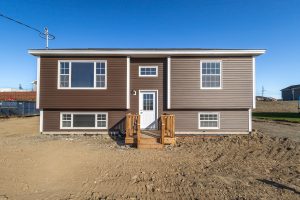As alternative housing solutions gain popularity, many people are considering tiny homes and modular homes as practical, efficient ways to build. While both offer modern, streamlined construction, they serve different purposes depending on lifestyle, budget, and long-term goals. At Arcwell Developments, we build both tiny homes and modular homes, with a focus on modular construction for larger residential projects. Understanding the differences between these two housing options can help you decide which is the right fit for your needs.
Mobility vs. Permanence
Tiny homes and modular homes also differ in their placement and mobility.
Tiny homes are often built on wheels, allowing homeowners to relocate as needed. This flexibility is a key advantage for those who prefer a mobile lifestyle or want to explore different living environments. However, regulations regarding where tiny homes can be parked vary by region, and they may be classified differently than permanent dwellings. Arcwell Developments also builds tiny homes on permanent foundations or screw piles, providing a more fixed housing solution. The choice between a mobile or permanent structure depends on the project’s specific needs, local regulations, and the homeowner’s preferences.
Modular homes are built for permanent placement on a foundation. They offer the stability of traditional homes while benefiting from the efficiency of off-site construction. While they cannot be moved once placed, modular homes provide long-term durability and the ability to expand over time.
Construction and Building Codes
Both tiny homes and modular homes emphasize efficient construction but follow different regulations.
Tiny homes can be built to meet local building codes, but many are classified under RV or mobile home regulations, which can impact where they can be placed. Some jurisdictions have specific zoning requirements for tiny homes, so it is important to research local regulations before building.
Modular homes must meet or exceed local and national building codes, just like traditional site-built homes. Because they are constructed in a controlled factory environment, modular homes undergo rigorous quality checks and inspections at each stage of the build.
Size and Livable Space
Tiny homes and modular homes differ primarily in size and layout.
Tiny homes typically range from 100 to 400 square feet, making them ideal for individuals or couples who embrace a minimalist lifestyle. Despite their compact footprint, tiny homes are thoughtfully designed to maximize every inch of space, often featuring lofted sleeping areas, multi-purpose furniture, and efficient storage solutions.
Modular homes start at around 500 square feet and can expand to several thousand square feet. They offer more flexibility in layout and functionality, allowing for multiple bedrooms, full-sized kitchens, and separate living areas. Because modular homes are constructed in sections, they can be tailored to a variety of needs, from small single-family residences to larger multi-unit developments.

RTM Homes
Ready-to-Move (RTM) homes offer a balance between the flexibility of modular construction and the permanence of traditional homes. Built in a controlled environment, RTM homes are fully constructed before being transported to a prepared foundation at their final site. This process reduces on-site labor and construction time while ensuring high-quality craftsmanship. Unlike tiny homes on trailers, RTM homes are considered permanent structures and typically qualify for standard home financing.
While many tiny homes are built on trailers for mobility, they can also be placed on permanent foundations or screw piles, making them a fixed housing solution. When built this way, tiny homes may be subject to different zoning and financing options, depending on local regulations.
Functionality and Everyday Living
Choosing between a tiny home and a modular home depends largely on lifestyle and space needs.
Tiny homes work well for individuals, couples, or those who prefer a minimalist way of living. They encourage efficient use of space and can be customized to include off-grid capabilities for those seeking a more sustainable lifestyle. However, they do require some adaptation, as storage and living space are limited.
Modular homes offer more flexibility for those who need additional space, whether for family living, home offices, or future expansion. They provide the benefits of traditional housing while incorporating modern construction techniques that improve efficiency and sustainability.
Finding the Right Fit
At Arcwell Developments, we specialize in modular homes while also offering high-quality tiny home solutions. Both options provide efficient, cost-effective housing, and the right choice depends on individual preferences, budget, and long-term plans. Whether you are looking for a compact, mobile-friendly home or a larger, permanent residence, we can help design and build a solution that meets your needs.
If you are considering a tiny home or modular home for your next project, contact Arcwell Developments today to explore your options.


